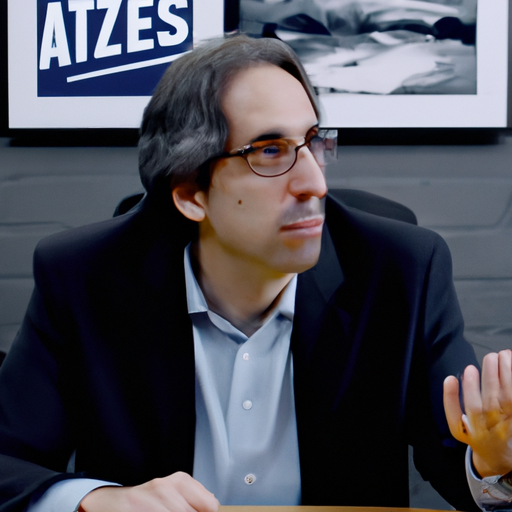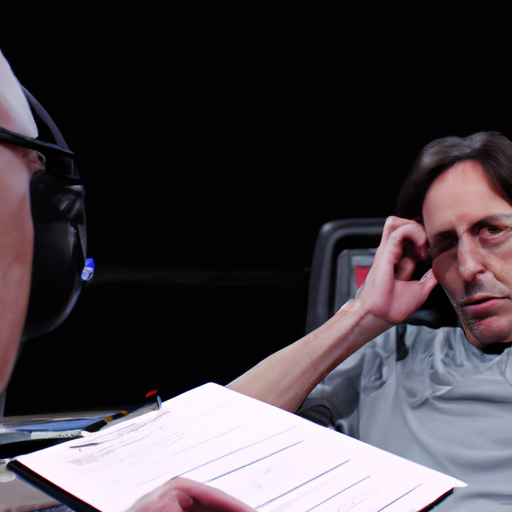Chris Russo thinks Adam Silver ordered ESPN to lay-off Jeff Van Gundy

The Alleged Connection Between Chris Russo and Adam Silver’s Involvement in Jeff Van Gundy’s Lay-Off at ESPN
Chris Russo, a prominent sports radio host, recently made headlines with his claim that NBA Commissioner Adam Silver was involved in ESPN’s decision to lay off basketball analyst Jeff Van Gundy. Russo, known for his outspoken nature, made the allegation during a radio segment, sparking a wave of speculation and debate among sports fans and media outlets.
Russo’s assertion is based on his belief that Silver, as the head of the NBA, wields significant influence over ESPN, a major media partner of the league. According to Russo, Silver used this influence to pressure ESPN into parting ways with Van Gundy, who had been critical of the league’s officiating and other issues during his time as an analyst.
While Russo’s claim may seem far-fetched to some, it is not entirely without merit. The relationship between sports leagues and media networks is a complex one, with both parties relying on each other for financial success. The NBA, like other professional sports leagues, benefits greatly from the exposure and coverage provided by networks like ESPN. In turn, networks rely on the leagues for content and access to players and coaches.
Given this symbiotic relationship, it is not unreasonable to suggest that league officials may exert some influence over network decisions. However, it is important to note that Russo’s claim is purely speculative and lacks concrete evidence. It is merely his opinion based on his understanding of the dynamics between the NBA and ESPN.
Furthermore, Adam Silver has a reputation for being a progressive and forward-thinking commissioner who values open dialogue and constructive criticism. He has been known to engage with players, coaches, and analysts on various issues, encouraging a healthy exchange of ideas. It seems unlikely that Silver would resort to pressuring a network to silence a respected analyst like Van Gundy simply because of his critical views.
ESPN, for its part, has denied Russo’s claim, stating that Van Gundy’s departure was part of a broader restructuring effort and not influenced by any external factors. The network has faced financial challenges in recent years, leading to several rounds of layoffs across various departments. Van Gundy’s departure, while unfortunate, appears to be a result of these broader economic factors rather than any specific vendetta orchestrated by Adam Silver.
In the absence of concrete evidence, it is important to approach Russo’s claim with skepticism. While it is not uncommon for sports leagues and media networks to have a mutually beneficial relationship, it is a leap to assume that Silver would go to such lengths to silence a single analyst. Without more substantial evidence, Russo’s claim remains speculative at best.
In conclusion, Chris Russo’s claim that Adam Silver ordered ESPN to lay off Jeff Van Gundy is an intriguing but unsubstantiated allegation. While the relationship between sports leagues and media networks is complex, it is unlikely that Silver would exert such influence over ESPN’s personnel decisions. Without concrete evidence, it is important to approach Russo’s claim with caution and consider it as nothing more than his personal opinion.
Analyzing Chris Russo’s Claims Regarding Adam Silver’s Influence on ESPN’s Decision to Lay-Off Jeff Van Gundy

Chris Russo, a prominent sports radio host, recently made some bold claims regarding NBA Commissioner Adam Silver’s alleged involvement in ESPN’s decision to lay off Jeff Van Gundy. Russo suggested that Silver had ordered the network to let go of Van Gundy due to his critical comments about the league. While these claims may seem sensational, it is important to analyze them objectively and consider the evidence before drawing any conclusions.
Firstly, it is crucial to understand the context in which Van Gundy’s comments were made. As a former NBA coach and current ESPN analyst, Van Gundy often provides insightful analysis and commentary on games and league-related matters. However, he has not shied away from expressing his opinions, even if they are critical of the NBA or its officials. This has earned him a reputation for being outspoken and unafraid to challenge the status quo.
Russo’s claims stem from a recent incident where Van Gundy criticized the officiating during a game. He suggested that the referees were favoring certain star players, leading to an unfair advantage. While this is not an uncommon sentiment among fans and analysts, Russo believes that Silver took offense to Van Gundy’s comments and used his influence to pressure ESPN into letting him go.
To evaluate Russo’s claims, it is essential to consider the relationship between the NBA and ESPN. The league has a significant partnership with the network, as ESPN holds the broadcasting rights for many NBA games and events. This close association raises questions about the potential for the league to exert influence over ESPN’s personnel decisions.
However, it is important to note that ESPN is a large media conglomerate with its own editorial independence. While the NBA may have a vested interest in maintaining a positive image, it is unlikely that Silver would directly intervene in personnel matters at ESPN. The network has a responsibility to its viewers and stakeholders to make decisions based on journalistic integrity and business considerations.
Furthermore, ESPN has faced financial challenges in recent years, leading to several rounds of layoffs. These decisions are typically driven by cost-cutting measures and strategic realignments rather than external pressures. It is plausible that Van Gundy’s departure was a result of these broader factors rather than any specific directive from Silver.
Additionally, it is worth considering the potential consequences of Silver involving himself in ESPN’s personnel decisions. Such interference would likely be met with significant backlash from the media, fans, and even other NBA teams. The commissioner’s role is to oversee the league’s operations and ensure fairness, not to dictate the employment status of individual analysts.
In conclusion, while Chris Russo’s claims regarding Adam Silver’s alleged involvement in ESPN’s decision to lay off Jeff Van Gundy may be intriguing, they lack substantial evidence. It is essential to approach these claims with skepticism and consider the broader context of ESPN’s decision-making process. While the NBA may have a vested interest in maintaining a positive image, it is unlikely that Silver would directly intervene in personnel matters at ESPN. Ultimately, the network’s layoffs are likely driven by financial considerations and strategic realignments rather than external pressures.
Examining the Potential Motives Behind Adam Silver Allegedly Ordering ESPN to Lay-Off Jeff Van Gundy, as Suggested by Chris Russo
Chris Russo, a prominent sports radio host, recently made a bold claim on his show, suggesting that NBA Commissioner Adam Silver had ordered ESPN to lay off Jeff Van Gundy. This allegation has sparked a heated debate among basketball fans and analysts alike, as they try to understand the potential motives behind such a decision. In this article, we will examine the possible reasons why Adam Silver might have taken such action, as suggested by Chris Russo.
One possible motive that Russo proposes is that Silver wanted to silence Van Gundy’s outspoken criticism of the league. Van Gundy, a former NBA coach turned ESPN analyst, has never been one to shy away from expressing his opinions. He has often criticized the league’s officiating, player behavior, and even the commissioner himself. Russo argues that Silver, feeling threatened by Van Gundy’s candid remarks, may have wanted to remove him from the public eye to avoid further scrutiny.
Another motive Russo suggests is that Silver wanted to control the narrative surrounding the NBA. Van Gundy’s commentary on ESPN has always been thought-provoking and insightful, often challenging the league’s decisions and policies. By removing Van Gundy from the network, Silver could potentially limit the exposure of dissenting voices and maintain a more favorable image for the NBA. This would allow him to shape the narrative in a way that aligns with the league’s interests.
Russo also speculates that Silver may have wanted to protect the league’s relationships with its broadcast partners. ESPN, being one of the NBA’s primary broadcast partners, holds significant influence over the league’s coverage and exposure. Van Gundy’s critical remarks could potentially strain the relationship between ESPN and the NBA, leading to negative consequences for both parties. By ordering ESPN to lay off Van Gundy, Silver could be seen as protecting the league’s interests and maintaining a harmonious partnership with its broadcast partners.
Furthermore, Russo suggests that Silver may have wanted to send a message to other analysts and commentators within the industry. By removing Van Gundy, a well-respected and influential figure in the basketball community, Silver could be signaling that dissenting voices will not be tolerated. This could serve as a warning to other analysts, discouraging them from openly criticizing the league or its decisions. In this way, Silver could exert control over the media narrative surrounding the NBA.
It is important to note that these are all speculative theories put forth by Chris Russo and have not been confirmed by any official sources. However, they do provide an interesting perspective on the potential motives behind Adam Silver allegedly ordering ESPN to lay off Jeff Van Gundy. Whether or not there is any truth to these claims, the debate surrounding this issue highlights the delicate balance between freedom of speech and the control of information within the sports industry.
In conclusion, Chris Russo’s claim that Adam Silver ordered ESPN to lay off Jeff Van Gundy has sparked a discussion about the potential motives behind such a decision. Russo suggests that Silver may have wanted to silence Van Gundy’s criticism, control the narrative surrounding the NBA, protect the league’s relationships with its broadcast partners, and send a message to other analysts. While these theories are speculative, they shed light on the complex dynamics between the league, its media partners, and the freedom of speech within the sports industry.

